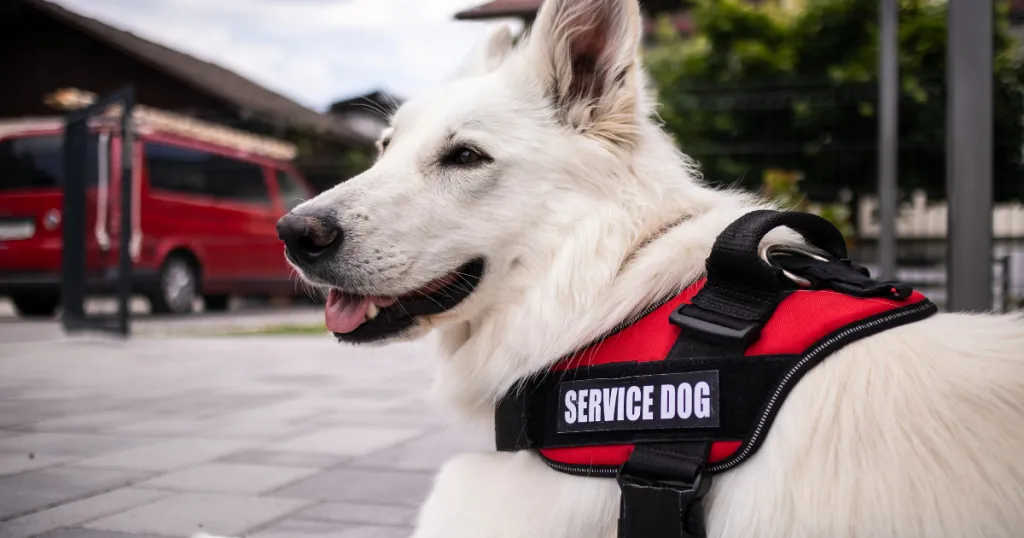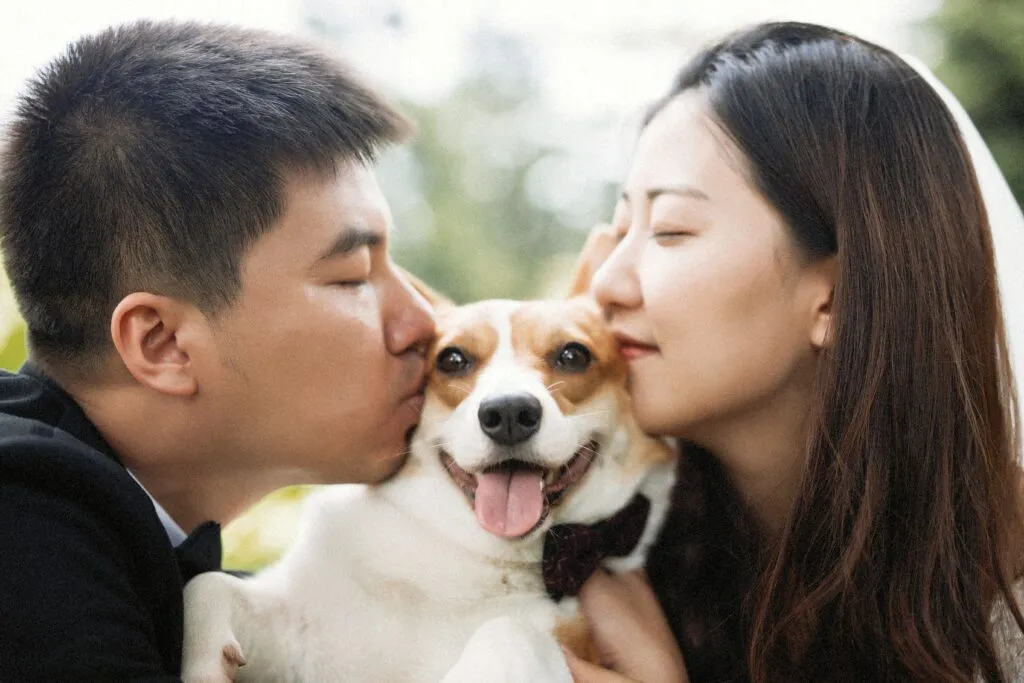For many, the bond with a dog transcends mere pet ownership; it’s a profound connection that offers unwavering comfort, grounding presence, and a sense of calm when life feels overwhelming. Dogs can be more than just companions; they can be vital emotional anchors. If you’re seeking solace from anxiety or depression, you might already share your life with one of the best Emotional Support Dog Breeds For Anxiety and depression without even realizing it.
The idea of preferring canine company over human interaction is widely relatable, often humorously expressed. The uncomplicated affection and constant presence of a dog can be a powerful antidote to human-induced stress. Beyond the joy and unconditional love they provide, certain dogs offer something more—something indispensable and potentially life-changing. Depending on an individual’s needs, some dogs step into specialized service and support roles. While many breeds can be trained, some possess inherent traits that make them particularly well-suited for these roles. For those navigating mood-related conditions, an emotional support dog can significantly complement formal treatment, providing a steady source of comfort and peace.
Before diving into specific breeds, it’s crucial to distinguish between service dogs and emotional support dogs.
Are Service Dogs the Same as Emotional Support Dogs?
No, service dogs and emotional support animals (ESAs), including emotional support dogs (ESDs), are not the same. Service animals, most commonly dogs, are trained to perform specific tasks to assist individuals with disabilities. This training is extensive and task-specific, preparing them to aid handlers with mobility issues, medical alerts (like for diabetes or severe allergies), or other health conditions. For instance, guide dogs for the visually impaired have been assisting people since 1929. The U.S. Department of Housing and Urban Development mandates specific training for service dogs, whereas emotional support dogs do not have such requirements. While basic obedience and behavior training are highly recommended for any animal providing support, it is not legally mandated for ESDs.

Despite lacking the formal training of service dogs, the impact of an ESD on its owner’s life is equally significant. The bond between an ESD and its human is characterized by deep connection and mutual reliance, enhancing quality of life in ways that are often hard to articulate. While dogs are the most common ESAs, other domesticated animals like cats, rabbits, and even more exotic pets can qualify to provide emotional support.
What is the Definition of an Emotional Support Dog?
Emotional support dogs provide therapeutic benefits such as anxiety relief, companionship, and comfort. The intense devotion and loving bond they share with their owners offer emotional stability that might otherwise be challenging to maintain. For individuals experiencing anxiety, depression, or other mental health challenges, the support of an ESD can be invaluable.

Unlike service dogs, there is no required training for ESDs. They are typically “prescribed” by a licensed mental health professional as part of a treatment plan. While any dog can offer support, certain breeds possess traits that naturally align with the role of an emotional support animal. These breeds often exhibit gentle, laid-back, and sociable temperaments, coupled with high trainability and a strong desire to please their human companions.
Four Key Benefits of Emotional Support Dogs for People with Anxiety and Depression:
1. Improved Sleep
For individuals with anxiety or depression, sleep patterns can become disrupted. The constant presence and sense of security provided by an emotional support dog can significantly aid in falling asleep and staying asleep, helping to break the cycle where sleep problems exacerbate mental health symptoms.
2. Emotion Regulation
ESDs can help their human companions better recognize and manage their emotions. When an ESD senses a potential emotional upset or intervenes during one, it can prevent overwhelming feelings from taking hold.
3. Enhanced Socialization
ESDs can act as social catalysts, facilitating connections with other people. Taking an ESD for a walk or visiting a dog park often leads to easier conversations, especially for individuals who might otherwise find social interactions challenging.
4. Structured Daily Routine
Emotional support dogs encourage their owners to be more engaged in their daily lives by providing a clear sense of purpose. The simple yet profound needs of a dog—feeding, petting, walking, and playing—offer a loving reason to get up and face the day.
What Size Dog is Best?
Any size dog can be an excellent emotional support animal, as size does not dictate the depth of love, comfort, and support they offer. However, certain breeds are predisposed to temperaments and trainability that make them particularly well-suited for the role.
Small ESDs
Small ESDs are ideal for individuals living in compact spaces, such as apartments. They are also generally easier to travel with, which can be important for navigating airline and other transportation regulations. If you envision a dog that fits comfortably on your lap, a smaller breed might be the perfect fit.

Medium to Large ESDs
Medium to large ESDs can be an excellent choice for those with more living space, perhaps with a yard. Their larger size might also offer an added sense of security. A larger, more energetic breed can even inspire a more active lifestyle, encouraging regular exercise through activities like hiking or jogging, which benefits both physical and mental well-being.
Key criteria to consider when choosing an emotional support dog breed include temperament, energy level, and shedding tendencies.
13 Top Emotional Support Dog Breeds for Anxiety and Depression:
Small Breeds:
1. Chihuahuas (Long-haired or Short-haired)
The Chihuahua, the world’s smallest dog breed, boasts a big personality and unwavering loyalty. Originating from Mexico, they are alert, energetic, and form deep bonds with their owners. Despite their tiny size, they possess a bold and confident demeanor. With a lifespan of 12–20 years, Chihuahuas are excellent companions. They thrive in indoor living and enjoy being the center of attention.
Pros:
- Kid-friendly with proper socialization.
- Calm and adaptable with sufficient exercise and interaction.
- Long lifespan (12-20 years).
- Confident, loyal, and outgoing.
Cons:
- Can be prone to nippiness or feistiness.
- Both coat types shed, particularly in spring and fall.
2. Poodles (Toy, Miniature, Standard)
Poodles are renowned for their high intelligence, grace, and distinctive curly coats. Originally bred as water retrievers in Germany, they come in three sizes: Toy, Miniature, and Standard (with a medium “Moyen” size also available). Poodles are quick learners, excelling in obedience and agility. Their hypoallergenic coat is a significant plus for allergy sufferers, though it requires regular grooming. Poodles are friendly, loyal, and energetic companions.
Pros:
- Highly intelligent and trainable.
- Respond well to learning new tricks.
- Active and energetic.
- Low shedding.
Cons:
- Require regular professional grooming.
- Need space to move and expend energy.
3. Cavalier King Charles Spaniel
This small, elegant toy breed is cherished for its affectionate nature and expressive eyes. Originally companions to royalty, Cavaliers thrive on human connection and love to cuddle. They are friendly with children and other pets, adapting well to both city apartments and country homes. Their silky coat and cheerful disposition make them a favorite for those seeking a loyal and gentle companion.
Pros:
- Sweet and affectionate temperament.
- Love to cuddle and snuggle.
- Gentle, friendly, and playful.
- Gets along well with people, dogs, and cats.
- Eager to please.
- Their charming features offer positive vibes.
Cons:
- Shedding can be significant.
- May exhibit timidity.
- Enjoy walks and opportunities to run and fetch.
4. Corgis (Pembroke Welsh & Cardigan Welsh)
Corgis are charming, short-legged dogs known for their playful personalities and strong herding instincts. Originating from Wales, they are intelligent, affectionate, and surprisingly athletic. With their distinctive large ears and expressive eyes, Corgis are beloved family pets and capable watchdogs. They thrive on attention and enjoy both playtime and cuddles.
Pros:
- Intelligent, alert, and protective.
- Friendly, affectionate, and obedient temperament.
- Light-hearted and beneficial for people with anxiety.
Cons:
- Require significant exercise due to their herding instincts.
- Shed heavily.

5. Pugs
Pugs are small, sturdy dogs characterized by their wrinkled faces, curly tails, and endearing personalities. This ancient breed from China is known for its affectionate nature and playful spirit. Pugs thrive on human companionship and are excellent with children and other pets. They have a laid-back attitude with a mischievous streak. Their expressive eyes and snorts bring laughter and warmth to any home.
Pros:
- Exhibit many human-like expressions.
- Versatile and get along well with various family members.
- Adapt well to urban and rural settings.
- Affectionate and enjoy playful antics.
- Have ample energy for outdoor activities.
- Curious about people and surroundings.
- Minimal shedding.
Cons:
- Require consistent training to manage energy levels.
- Facial structure can be a concern for some.
- Can be mischievous.

6. Dachshunds
Dachshunds, often called “wiener dogs,” are easily identifiable by their long bodies and short legs. Originally bred in Germany to hunt badgers, they are courageous, clever, and full of personality. Available in standard and miniature sizes with various coat types, Dachshunds are loyal and playful companions. They have a surprisingly loud bark for their size and enjoy exploring.
Pros:
- Highly trainable.
- Affectionate, playful, and friendly.
- Excellent family companions.
- Possess good stamina and energy.
- Enjoy outdoor play, digging, and hunting activities.
Cons:
- Require obedience training, especially for public outings.
- Need regular brushing and ear cleaning.
- Can be stubborn initially.
- May engage in digging behaviors.

7. Yorkshire Terriers (“Yorkies”)
Yorkshire Terriers are small but bold dogs known for their silky, floor-length coats and confident personalities. Originally bred in England to catch rats, they have become beloved companion dogs. Yorkies are energetic, intelligent, and fiercely loyal. Despite their delicate appearance, they possess a feisty and adventurous spirit and enjoy being the center of attention.
Pros:
- Small and portable, making them ideal travel companions.
- Trainable and sensitive to their surroundings.
- Coat is long and silky with minimal shedding.
- Enjoy chasing, playing, and pouncing.
- Curious, affectionate, and brave.
Cons:
- Can be prone to barking at unfamiliar sounds.
- Coat requires regular grooming and trimming.
- Need daily walks and playtime.
- Their small size can make them vulnerable to accidental injury.

8. Bichon Frises
Bichon Frises are small, white, cloud-like dogs with cheerful personalities and hypoallergenic coats. Originating from the Mediterranean, they are known for their affectionate and playful nature. Bichons are friendly, social, and thrive on being around people, making them excellent family pets. Their soft coats require regular grooming.
Pros:
- Hypoallergenic coat, akin to a large cotton ball.
- Easy-going and intelligent.
- Alert watchdogs.
- Curious, confident, and warm.
- Enjoy staying close to their owners.
- Shed minimally and require brushing several times a week.
Cons:
- Their white coat requires diligent cleaning to prevent staining.
- Their appearance resembles miniature poodles.
- Energetic and require daily exercise.
Medium to Large Breeds:
9. Golden Retrievers
Golden Retrievers are consistently among the most popular dog breeds, celebrated for their friendly temperament, intelligence, and loyalty. Originally bred in Scotland as hunting companions, Goldens excel in obedience, service work, and as family pets. They are gentle with children, amiable with other animals, and thrive on human companionship.
Pros:
- Known for exceptional friendliness, kindness, and strong bonding abilities.
- Even-tempered and well-mannered.
- Excellent at retrieving, making them highly trainable for tasks.
- Very huggable and affectionate.
- Expect to be treated as a family member.
Cons:
- Shed significantly.
- Prone to hip and skin issues.
- Require considerable exercise.
- Have a high incidence of cancer.

10. Labrador Retriever
Labrador Retrievers are beloved for their friendly disposition, intelligence, and versatility. Originally bred in Newfoundland as fishing and hunting companions, Labs are one of the most popular breeds globally. They are highly trainable, eager to please, and excel with families, children, and other pets. Labs come in three colors and are known for their love of water and outdoor activities.
Pros:
- Identified as particularly well-suited to enhance happiness and reduce depression.
- Considered among the best breeds for anxiety sufferers due to their cheerful and even-tempered nature.
- Intelligent and easily trained, maintaining responsiveness and calmness.
- Appreciate consistency.
- Often used as guide dogs due to their ability to learn daily routines.
- Eager to please their owners.
Cons:
- High energy levels require daily exercise.
- Highly food-motivated, necessitating careful treat management.
- Can be overly enthusiastic with greetings.
- Very energetic.

11. Irish Wolfhounds
Irish Wolfhounds are among the tallest dog breeds, distinguished by their impressive size and gentle temperament. Originally bred in Ireland to hunt wolves, these majestic dogs combine strength with kindness and loyalty. Despite their stature, they are calm, affectionate, and excellent with families and children.
Pros:
- Naturally protective and patient.
- Sensitive nature allows them to attend to and improve their owner’s mood.
Cons:
- Short lifespan (approximately 6 years).
- Exceed 100 pounds in weight.

12. Border Collies
Border Collies are widely recognized as one of the most intelligent and hardworking dog breeds. Originally bred for herding sheep, they are known for their intense focus, agility, and stamina. Border Collies thrive on mental and physical challenges, making them ideal companions for active individuals and families. Their keen intelligence and eagerness to please require consistent training and ample exercise.
Pros:
- Extremely intelligent, fearless, and affectionate.
- Devoted to their owners.
- Known for their intuitive understanding of emotions.
- Excel in canine competitions like agility.
Cons:
- Sensitivity to sound can sometimes lead to nervousness.
- Higher risk of eye and hip issues.
- May not be ideal with very young children in all cases.

13. German Shepherds
German Shepherds are popular for their intelligence, courage, and strong work ethic. Originally bred for herding and guarding, they have become trusted police, military, and service dogs due to their trainability and protective nature. German Shepherds are loyal and devoted family companions who thrive with a job to do.
Pros:
- Highly intelligent, strong, and agile.
- Very protective and loyal.
- Adapt easily to their environment.
- Take their guarding role seriously.
Cons:
- High stamina requires significant outdoor activity.
- Shed considerably.

Consider a Rescued Companion
Adopting a dog from a shelter can be an incredibly rewarding experience. Rescue dogs, often mixed breeds, can be just as loving, compassionate, loyal, and trainable as purebred dogs, sometimes without the specific “intense” traits of certain pure breeds. These dogs often have a unique appreciation for their second chance at life.

Breeds to Approach with Caution
While any dog can offer emotional support, certain breeds may be less inclined towards the close, affectionate companionship desired in an ESD. For example, breeds like Shar-Peis, while loyal, might not be as cuddly or overtly loving.


Breeds such as the Shiba Inu and Pekingese often have more independent personalities and may not be as inclined to offer effusive affection.
Emotional Support Dogs Provide Comfort and Support
Unlike service dogs, emotional support dogs are not required to perform specific tasks for a disability; their primary role is to provide emotional stability and unconditional love. As highly affectionate animals, dogs excel in this capacity. Giving and receiving affection, along with having companionship, are fundamental aspects of a meaningful and fulfilling life.

If you are experiencing anxiety or depression, discussing the possibility of an emotional support dog with your licensed mental health provider could be immensely beneficial. The potential advantages—improved mood, reduced anxiety, enhanced overall well-being, better sleep, increased confidence, and improved self-esteem—can profoundly change the course of your life. Imagine sharing your journey with an inseparable best friend; life can indeed look brighter.
“Imagine yourself to be the person your dog believes you are.”
